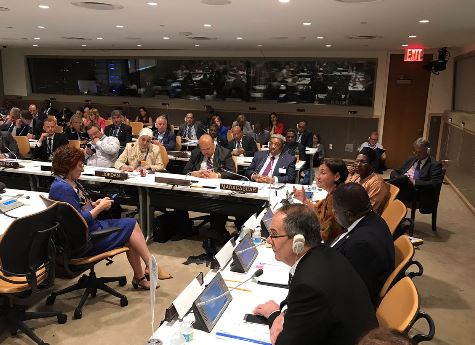

Vital parliamentarians work to support UN’s Global Goals
On Monday 17 July 2017, on behalf of the British Group of the Inter-Parliamentary Union, I attended the IPU Parliamentary event at the United Nations High Level Political Forum on the Sustainable Development Goals. The HLPF took place 10-20 July, and a four member delegation from the UK All Party Parliamentary Group on the UN Global Goals for Sustainable Development visited New York at the same time to conduct a study visit. In addition to attending the HLPF for BGIPU, I joined the APPG delegation for many of their meetings.
The annual HLPF monitors implementation of Agenda 2030. Each year it discusses implementation of specific goals and a number of member states present a Voluntary National Review (VNR) on their national strategies and their progress in meeting these global targets. In 2017, 44 countries presented VNR’s. Each VNR is presented by a Minister who then submits to questions from the delegations of other countries, UN agencies and civic society.
The IPU Parliamentary meeting held to coincide with the HLPF included presentations from speakers and contributions from the floor reporting on progress in individual countries. In addition to the obvious scrutiny role, with MP’s holding governments to account for their strategies and delivery, it was stressed regularly that parliamentarians had a key role when agreeing national budgets and delivering legislation that support SDG targets. Delegates recorded both successes and failures in this regard, but it was clear to me that the existence of the Global Goals provided real momentum for parliamentarians everywhere to insist upon accountability and pressurise governments for specific legislation and budgetary commitments.
Particularly positive examples included the national strategy of Sierra Leone, the parliamentary engagement in Afghanistan, and the attempts to overcome resistance to gender quotas. But the themes were of more significance. The whole of government approach needed for the SDG’s demanded that MP’s adopt an all-of-Parliament scrutiny system ensuring that SDG implementation is the responsibility of all Committees not just those dealing with development. And insisting on SDG analysis of all budgets and legislative proposals would ensure consistency and help secure the decisions required for delivery.
UNDP and the IPU have jointly produced an excellent resource for Parliamentarians, the self-assessment toolkit booklet. The IPU leadership issued a statement after the meeting, available on their website.
In addition to the formal IPU event, and listening to individual Voluntary National Reviews, I had the opportunity to hear and discuss the Agenda 2030 strategy with senior representatives in the United Nations and in the UK Mission to the UN. New UN Secretary General Antonio Gu-terres made a very forceful speech at the HLPF on 17 July in which he outlined the major strategic challenges facing the United Nations and his belief that the solutions to all of these challeng-es lay in the potential of the global goals. Comprehensive, universal, and addressing underlying causes, Agenda 2030 is the best chance yet to tackle insecurity, fragility, chaotic urbanisation, resource scarcity, and inequalities. He highlighted the critical connection between sustaining peace and development, underlining that investing in development was the best prospect for se-curing peace.
Deputy Secretary General Amina Mohammed outlined their proposed reforms of the development system, integrating Agenda 2030 into all of the work of the United Nations, using the Global Goals as the guiding set of principles and targets to make sure the UN system was more effective in every respect. The new leadership is trying very hard, with UK support, to break down the barriers that exist between UN agencies, delivering strengthened united action by the United Nations in individual countries and more efficient and effective leadership globally.
Ambassador Matthew Rycroft and his excellent team at the UK Mission were very clear that raising Britain’s profile on the global stage was essential given our changing relationship with the European Union. The UK could take pride in our contribution to global development and in our participation on the Security Council and our representatives used all of the tools of diplomacy to try to influence events, statements, and the future direction of the United Nations. In individual meetings with UN offices, the financial contribution of the UK to peacebuilding in particular was widely praised. Many delegates and officials, however, expressed the hope that UK leadership on development and security would be matched by development of a full UK strategy on the Global Goals, and a Voluntary National Review by the UK before 2020.
I would strongly recommend that the UK Government commit to a timetable for their strategy and review, and that MP’s and Peers insist on a proper role in scrutinising the strategy and pre-paring the review. And when we exercise that role in Parliament, we must recognise that the Global Goals affect every area of policy. Action to deliver them must be more joined up than ev-er before. This job – like the Goals themselves – is for everyone, not just the IDC.













